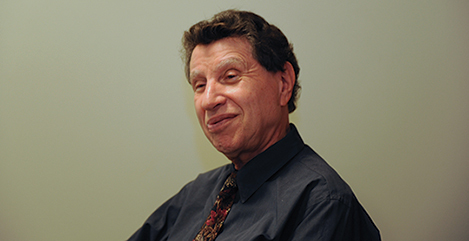
The Graduate Center mourns the passing of Distinguished Professor EmeritusMorris Dickstein (English, Theatre and Performance, and Liberal Studies), renowned literary scholar, cultural historian, teacher, and public intellectual who died on March 23 at age 81. Lauded as “one of our best and most distinguished critics of American literature,” Dickstein was equally recognized for engaging the public beyond academia.
His scholarship ranged from contemporary literature and American studies to English Romantic poetry to film history. His books include Gates of Eden: American Culture in the Sixties, which was nominated for a National Book Critics Circle Award in criticism and selected as one of the best books of the year by The New York Times Book Review, andDancing in the Dark: A Cultural History of the Great Depression, another finalist for the National Book Critics Circle Award in criticism and recipient of the Ambassador Book Award in American Studies from the English-Speaking Union. Among his other books areDouble Agent: The Critic and Society; Leopards in the Temple: The Transformation of American Fiction, 1945-1970; A Mirror in the Roadway: Literature in the Real World; and his memoir,Why Not Say What Happened: A Sentimental Education.
He published widely in scholarly journals, served as contributing editor of The Partisan Review, for which he also wrote film criticism, and wrote for The New York Times Book Review, Times Literary Supplement, The American Scholar, Bookforum, The Nation, Dissent, and other publications
At The Graduate Center, Dickstein held faculty appointments in the Ph.D. programs in English and Theatre and Performance and the Liberal Studies master’s program. He taught courses in the Film Studies and American Studies Certificate programs. He founded The Graduate Center’s Center for the Humanities in 1993 and was a senior fellow of the Center for three years following his retirement in 2013. In his time at the Center, Professor Dickstein established the annual Irving Howe Lecture, generously endowed by Max Palevsky in memory of the literary critic, focusing on three of the subjects closest to Irving Howe’s heart: politics, Yiddish and Jewish culture, and the modern literary imagination; as well as the Stanley Burnshaw lecture, and hosted every other year by The Harry Ransom Center for Research in the Humanities at the University of Texas, Austin. He was, in addition, a member of the National Society of Film Critics and served on the board of the National Book Critics Circle, as vice-chair of the New York Council for the Humanities, and as president of the Association of Literary Scholars and Critics.
A native New Yorker, born in 1940, Dickstein studied at Columbia, the Jewish Theological Seminary, Cambridge, and Yale. He taught at Columbia University and Queens College.
Reflecting on his memoir, Dickstein said, “After quite a lot of critical and historical writing I wanted to do something more personal, to tap into a different part of the brain and write in a different voice — more evocative and less analytical, more narrative and less argumentative. And why not, since I’ve always thought of myself as a writer, not strictly a critic?”
The Graduate Center community extends sincerest sympathies to his family, colleagues, students, friends, and devoted readers.
-Story by Janis Ruden, The Graduate Center, CUNY